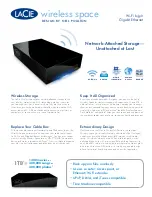
169
Glossary
Giga762SX WLAN dsl / eng / A31008-M705-W171-1x-5819 / glossary.fm / 02.07.2008
Sc
hablone 2
005_0
7_2
7
BSSID
Basic Service Set ID
BSSID permits unique differentiation of one wireless network (
WLAN
) from another. In
Infrastructure mode
, the BSSID is the
MAC address
of the
Access point
. In wireless net-
works in
Ad-hoc mode
, the BSSID is the MAC address of any one of the participants.
Client
A client is an application that requests a service from a
server
. For example, an HTTP cli-
ent on a PC in a local network requests data, i.e. Web pages from an HTTP server on the
Internet
. Frequently the network component (e.g. the PC) on which the client applica-
tion is running is also called a client.
DHCP
Dynamic Host Configuration Protocol
DHCP handles the automatic assignment of
IP addresses
to network components. It was
developed because of the complexity involved in defining IP addresses in large networks
– especially the
Internet
– as participants frequently move, drop out or new ones join.
A DHCP server automatically assigns the connected network components (DHCP
Cli-
ents
)
Dynamic IP addresses
from a defined
IP pool range
thus saving a great deal of con-
figuration work. In addition, the address blocks can be used more effectively: Since not
all participants are on the network at the same time, the same IP address can be
assigned to different network components in succession as and when required.
The Giga762SX WLAN dsl includes a DHCP server and uses it to assign automatic IP
addresses to PCs in the local network. You can specify that the IP addresses for certain
PCs are never changed.
DHCP server
See
DHCP
DMZ
Demilitarised Zone
DMZ describes a part of a network that is outside the
Firewall
. A DMZ is set up, as it
were, between a network you want to protect (e.g. a
LAN
) and a non-secure network
(e.g. the
Internet
). A DMZ is useful if you want to offer
Server
services on the Internet
that are not to be run from behind the firewall for security reasons or if Internet appli-
cations do not work properly behind a firewall. A DMZ permits unrestricted access from
the Internet to only one or a few network components, while the other network com-
ponents remain secure behind the firewall.














































